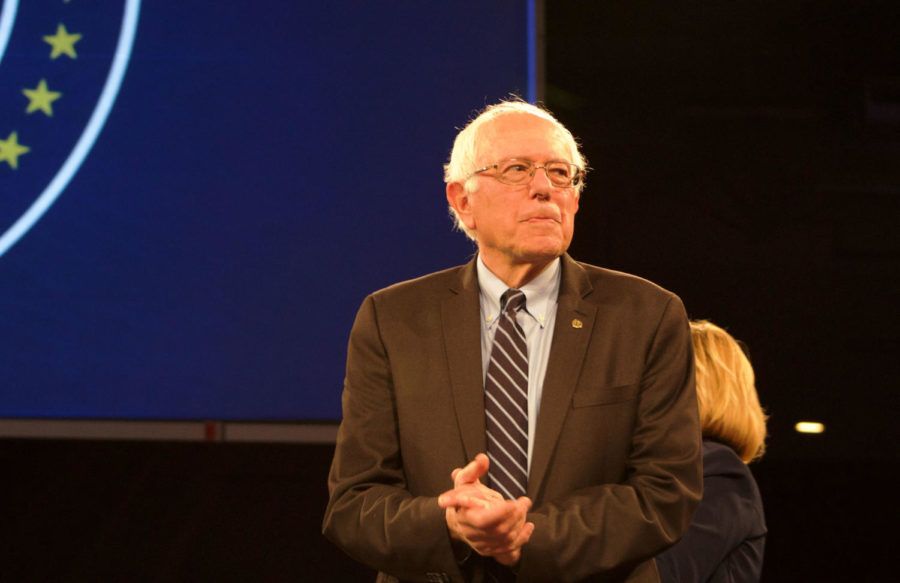How could Bernie Sanders’ plan come to fruition?
Bernie Sanders spoke about his proven track-record to get things done and a hope for change at the annual Jefferson-Jackson dinner at Hy-Vee Hall in Des Moines on Saturday.
November 13, 2015
Having a plan is one thing, figuring out how to pay for it is another.
Democratic presidential candidate Bernie Sanders has touted numerous government-funded programs, including universal health care, paid maternity leave and tuition-free college.
Critics have questioned the reality of Sanders’ proposals when it comes to the country being able to fund his proposed programs.
“If Sanders’ plan is to just tax the top 1 percent, it won’t be enough,” said Joydeep Bhattacharya, professor of economics. “But if taxes on the richest 10 percent go up, then most of this can be funded.”
Bhattacharya said the government could also ask employers to help decrease the public’s cost of educating people it will hire in the future via taxes.
“[The employer will] be returned the favor later in the life cycle in the form of higher pensions,” Bhattacharya said.
Bhattacharya said getting tuition-free public universities would be the most important program and should be the first proposal that Sanders should push through if elected president.
“The biggest effects would come from the program to offer tuition-free public education,” Bhattacharya said.
One effect from tuition-free college would be higher wage incomes bringing up the national income.
If public college were to be tuition-free, private universities may be forced to cut tuition rates as well, Bhattacharya said.
Mack Shelley, professor of political science, said because corporate interests get the first crack at government funding, Sanders’ first move should be to pass a law negating Citizens United v. Federal Election Commission.
The Supreme Court made the decision to protect political spending under the First Amendment in 2010. The decision made it so corporations and unions could give unlimited funds to political movements.
“Citizens United just sort of has to go for a lot of what Bernie would be interested in implementing,” Shelley said.
As for paid maternity leave, the program already has a decent amount of support, Bhattacharya said. He said the government could negotiate with corporations.
“[Corporations] can get a cut in corporate tax rates in return for offering paid parental leave,” Bhattacharya said. “Not all of this has to be tax-payer financed.”
Bhattacharya said Sanders’ advocacy in wanting to tackle the gap of income inequality can be done by taxing the wealthy, but trying to reduce opportunity inequality is more effective.
“There is always a luck factor behind high incomes,” Bhattacharya said.
Bhattacharya said it makes sense to tax some of that luck away so more people can get the opportunity to earn high incomes by working hard.
“It is also a good idea to tax wealth, especially the kind that easily moves between generations,” Bhattacharya said.
Bhattacharya also said capital gains and other speculative gains should be taxed to help reduce the income inequality gap.
Sanders’ policy states he would fund free college tuition through a tax on Wall Street speculation, according to his campaign website.
When it comes to health care, Sanders wants to extend Medicare coverage to all and switch to a single-payer system.
“Research shows that single-payer systems are overall cheaper,” Bhattacharya said.
Bhattacharya said many European countries have found success with a single-payer system and that the system makes the cost of health care more democratic. This has, in return, helped reduce inequality of opportunity.
“It would take the Affordable Care Act further,” Bhattacharya said.
Bhattacharya added that while the switch may appear expensive, the societal benefits and the savings on insurance premiums would even out the scale in the end.
The downside of universal health care is the earnings for medical innovation would be less than it is now.
Criticism on the price tag of Sanders’ plans ramped up after a Wall Street Journal story explained that his plan would cost $18 trillion dollars or “the largest peacetime expansion of government in modern American history.”
Sanders’ supporters such as McKinly Springer, junior in pre-business and member of Students for Bernie, are confident his policies could be funded.
“I have no concerns regarding our ability to fund the programs Sanders is calling for,” Springer said.
Springer said the distribution of wealth and the places the government is putting its money are immoral and not sustainable.
“We’re the wealthiest country in the world,” Springer said. “We have to reconsider where and how we distribute that wealth.”







